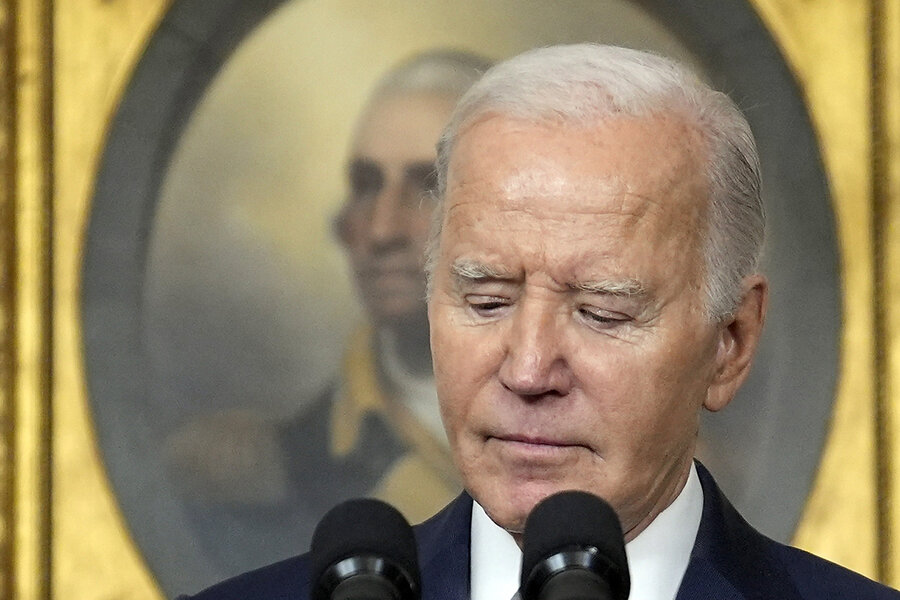Age issue resurfaces as election trouble spot for Biden
Loading...
| Washington
Voter concerns about President Joe Biden’s age and mental acuity have long been his biggest liability.
And a day that technically brought him good news on the legal front – a special counsel’s decision not to file criminal charges over mishandling of classified documents – may have compounded that political challenge.
Why We Wrote This
President Joe Biden’s advisers have long tried to limit his interactions with the media. More appearances could help reassure voters, but Thursday night’s question-and-answer session showed the risks.
In a hastily scheduled appearance before the cameras Thursday evening, Mr. Biden took exception to special counsel Robert Hur’s characterization of him in his final report as someone who would come off in court as “a well-meaning, elderly man with a poor memory.”
“My memory is fine,” Mr. Biden said testily, even as he misidentified Egypt’s president as the president of Mexico.
Former President Donald Trump has also misstated key figures in recent months, mixing up Republican challenger Nikki Haley and former House Speaker Nancy Pelosi. But surveys make clear that voters see the 81-year-old incumbent’s mental and physical health as a greater problem than that of the 77-year-old former president.
An NBC News poll released Thursday showed that 76% of registered voters have concerns about the president’s age. Fewer than half have the same concerns about former President Trump. Mr. Trump’s multiple felony charges are a much bigger issue for voters, with 61% saying they have concerns.
Voter concerns about President Joe Biden’s age and mental acuity have long been his biggest liability.
And a day that technically brought him good news on the legal front – a special counsel’s decision not to file criminal charges over President Biden’s mishandling of classified documents from his days as vice president – may have compounded that political challenge.
In a hastily scheduled appearance before the cameras Thursday evening, Mr. Biden took exception to special counsel Robert Hur’s characterization of him in his final report as someone who would come off in court as “a well-meaning, elderly man with a poor memory.”
Why We Wrote This
President Joe Biden’s advisers have long tried to limit his interactions with the media. More appearances could help reassure voters, but Thursday night’s question-and-answer session showed the risks.
“My memory is fine,” Mr. Biden said testily, even as he misidentified Egypt’s president as the president of Mexico. Mr. Biden has also recently misstated the leaders of Germany and France in remarks at fundraisers, referring to long-ago leaders as if they are still alive and in power.
Former President Donald Trump – the heavy favorite for his party’s 2024 presidential nomination – has also misstated key figures in recent months, appearing to mix up top Republican challenger Nikki Haley and former House Speaker Nancy Pelosi and apparently confusing the leaders of Turkey and Hungary.
But surveys make clear that voters see the 81-year-old incumbent’s mental and physical health as a greater problem than that of the 77-year-old former president.
An NBC News poll released Thursday, before the special counsel report and Mr. Biden’s response, showed that 76% of registered voters have major (61%) or minor (14%) concerns about the president’s physical and mental state. Fewer than half have the same concerns about former President Trump. Mr. Trump’s multiple felony charges are a much bigger issue for voters, with 61% saying they have concerns, per NBC.
Mr. Biden – the oldest president in American history – is not the only Washington politician of advanced years. Congress features many super-agers, some of whom don’t raise an eyebrow when it comes to their perceived vigor and sharpness, and others who do. Aging is highly individual and does not necessarily determine one’s ability to function at a high level.
Still, serving as president of the United States, the highest-profile leadership role on the planet, is a uniquely challenging job.
Mr. Biden’s lawyers objected strongly to Mr. Hur’s many references to the president’s memory, saying his “inability to recall dates or details of events that happened years ago is neither surprising nor unusual,” especially given the particulars of storing and packing materials between residences.
Democratic strategists, too, have pushed back strongly on the Hur report as a political hit job by a Republican special counsel that went far beyond his purview.
Mr. Biden’s advisers have long tried to limit his interactions with the media. In three-plus years in office, the president has had just 33 press conferences, compared with 88 during Mr. Trump’s one term and 163 over President Barack Obama’s two terms.
Most of the time, when Mr. Biden takes questions from reporters, in formal or informal settings, the interactions have been innocuous, and convey an openness to scrutiny that seems essential to a functioning democracy.
But such scrutiny comes with risk.
In Thursday night’s contentious session, Mr. Biden emotionally took special exception to references to his late son, Beau Biden, whose death in 2015 was noted by the special counsel as a reason not to prosecute the president. “How in the hell dare he raise that,” Mr. Biden said.
Yet as the assembled reporters shouted question after question about his memory, it ran the risk of reinforcing the issue in voters’ minds. It also produced uncomfortable moments. A particularly aggressive question from a Fox News reporter exemplified the nature of the exchanges, and the difficulty of responding.
“How bad is your memory, and can you continue as president?” posed the reporter, Peter Doocy. The president shot back, “My memory is so bad that I let you speak.”








